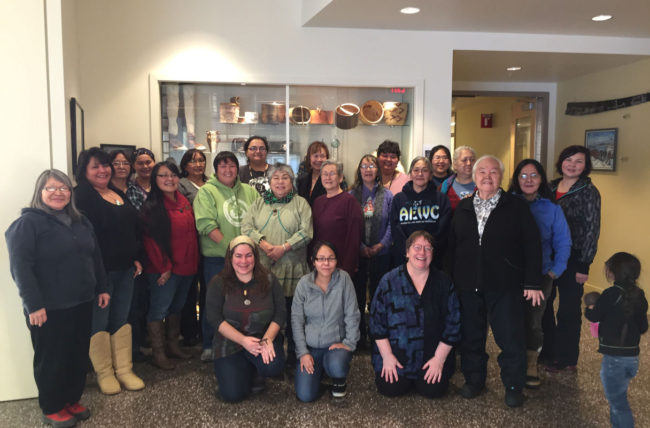
Recently, on the top floor of Norton Sound Regional Hospital, two-dozen women gathered around a large table. They traveled to Nome for a conference to discuss a dire concern: high rates of cancer, developmental disabilities and other diseases linked to contaminants and former military sites in the Bering Strait.
“We hear over and over: by the time we found out we have cancer, it’s too late. We have a cancer crisis. So, my goal was to bring women from each of the 16 communities NSHC serves to document health concerns,” said Vi Waghiyi of Savoonga. She’s the environmental health and justice program director for ACAT: Alaska Community Action on Toxics.
At this gathering in Nome, the woman began documenting their communities’ health concerns. With support from ACAT, they want to present a report to healthcare providers and policymakers to ask for change.
“We wanted to empower the women—how to testify, write letters to the editor—because as women, we’re the backbones of our communities,” said Waghiyi.
The women raised concerns about lack of information on toxic sites, lack of effective communication with health care providers, and not having environmental health threats taken seriously. According to ACAT Executive Director Pam Miller, “There’s concern that a lot of this illness might be related to chemical exposures from military contamination, and also this region, because it’s in the Arctic, is on the receiving end for global contaminants that move into this area on wind and ocean currents from all over the world.”
Military contamination has been of much concern on St. Lawrence Island, where two U.S. bases were established during the Cold War. Savoonga health aide Annie Alowa started noticing an unusual number of cancers among the people—before she passed away of cancer herself in 1999. Waghiyi says these contaminants are still in the marine mammals that constitute most of island residents’ traditional diets.
While some of these larger battles over eliminating toxins may take years to wage, there are short-term goals in sight. The gathering concluded with a call to Senator Donny Olson in Juneau thanking him for support of the Toxic Free Children’s Act, which would eliminate toxic flame-retardants from children’s products. The group asked him to push for an even stronger bill during this legislative session. While Olson is in the minority this year, he says he’ll continue leveraging his support and call on the women for testimony.
“That’s exactly what we need,” said Olson, over the teleconference. “We need people out there who are passionate about the subject, who are knowledgeable and who go and make their voices known.”
Waghiyi says it can be overwhelming trying to change the business practices of large companies that are producing products with toxins, but now a grandmother herself, she says there’s no other choice but to keep fighting for a safer, cleaner world for her children.
“We’re up against multinational corporations that have no idea what’s going on with our people. We have to be the conscience,” she said. “So that’s why we go miles and miles away, travel to Washington, DC. We have a right to be at the table for making decisions.”
ACAT was founded in 1997, and is composed mostly of women who work for environmental health and justice in Alaska Native communities.
